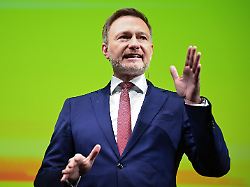Despite demands from economists
Lindner: Climate money will no longer come in this election period
January 14, 2024, 11:15 a.m
Listen to article
This audio version was artificially generated. More info | Send feedback
In their coalition agreement, the traffic light parties announced climate money. But the technical implementation for a payout will take several years and should not be possible until 2025. Now Lindner makes it clear: Climate money must be decided in the next federal election.
Federal Finance Minister Christian Lindner does not want to decide on the payment of climate money planned by the traffic light coalition until the next legislative period. “From 2025 we can technically make a per capita payment,” said the FDP leader of the “Neue Osnabrücker Zeitung” with a view to the technical requirements. “We are on schedule. Whether we politically restructure the funding landscape in this direction will have to be decided after the next election.”
The idea of climate money is to transfer the income from the per capita CO2 price back to people, said Lindner. “Currently, the income is used to promote heating, building renovations, green steel production, charging stations for electric cars and so on.” The FDP leader added: “In short, because one household receives funding for a heat pump, several hundred others cannot receive climate money that year.”
“You can’t spend the money twice,” emphasized the finance minister. “The climate money would replace the subsidies we have now.” In his view, a decision on such a system change could only be made after the next federal election.
In their coalition agreement, the traffic light parties announced climate money in 2021. There is talk of a “social compensation mechanism” to cushion future energy price increases and ensure the acceptance of CO2 pricing. If the CO2 price rises for climate protection reasons, money should be put into citizens’ accounts to compensate. However, exactly what the climate money should look like remained unclear, as did the schedule. Given the tight budget, it is unclear whether the federal government can afford this.
Parts of politics, economists and consumer advocates are calling for climate money to be paid out quickly in order to compensate for the increase in CO2 prices for consumers at the beginning of the year. It would particularly relieve the burden on people with low incomes. The national CO2 pricing for gasoline, diesel, heating oil and natural gas was introduced in 2021 at 25 euros per ton; in January it rose from 30 euros to 45 euros. The instrument is intended to provide incentives to reduce the consumption of fossil fuels and thus CO2 emissions.
